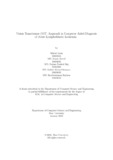Vision Transformer (ViT) approach in computer aided diagnosis of acute lymphoblastic leukemia
Date
2023-01Publisher
Brac UniversityAuthor
Amin, SifatulJawed, MD. Samin
Rashed Raj, MD. Rejuan
Ahmed Saimoon, MD. Sabbir
Rayhan, MD. Rakibuzzaman
Metadata
Show full item recordAbstract
Blood cancer is a serious and potentially deadly type of cancer that affects the pro duction of blood cells in the body.Leukemia, lymphoma, and myeloma are the three
primary kinds of blood cancer.Leukemia, which is the most common and deadly type
of blood cancer, is characterized by the abnormal and unexpected development of
white blood cells (leukocytes) in the bone marrow. Leukemia comes in two primary
varieties: acute and chronic. Acute leukemia progresses more quickly and is more
common in children, while chronic leukemia progresses more slowly. Early detec tion of leukemia is important for proper treatment, as it can be fatal if not treated
promptly. One method of detecting leukemia is through imaging, which is quick and
inexpensive and does not require specialized equipment or laboratory tests. How ever, manual classification of leukemia cells by hematologists can be time-consuming
and prone to errors. In recent years, the preferred technique for vision application is
convolutional neural networks (CNNs).CNN have demonstrated their effectiveness in
automatically classifying medical images. However, their limited local receptive field
can prevent them from learning global context information. An alternative to CNNs
that has shown promise is the Vision Transformer (ViT), which uses self-attention
between image patches to process visual information. However , Vit does not work
very well without a large dataset so we are using the ISBI 2019 data set, a dataset
of 10000+ images and this data set needs more polishing, we’re not just suggesting
a transformer architecture for diagnosing ALL; we’re also laying the groundwork for
its polishing and sharing every piece of code we’ve used in our research. Our Vit
model produces an accuracy of 81.5%, and shows how it has potential to reach new
heights. The suggested approach has the ability to accurately differentiate between
cancer cells knows as B-lymphoblast cells and normal cell known as B-lymphoid
precursors and can be utilized as an efficient technique for assisting in the effective
discovery of acute lymphoblastic leukemia through computer assistance.

